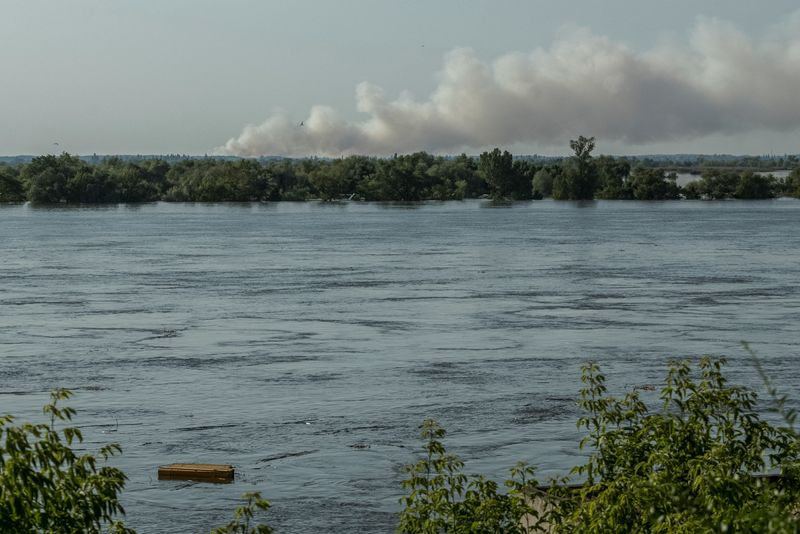By Andrew Osborn
(Reuters) - A top Moscow-backed official in part of Ukraine controlled by Russia has said that the collapse of the giant Kakhovka Dam has handed the Russian military a tactical advantage, but a prominent U.S. military analyst saw little immediate impact.
The vast Soviet-era Kakhovka dam, under Russian control, was breached in the early hours of Tuesday, unleashing floodwaters across a swathe of the battleground in southern Ukraine.
Ukraine and Russia blame each other for the episode, which has forced thousands to flee. Some experts say the dam may have collapsed due to earlier war damage and intense pressure on it caused by the way its gates were operated by Russian-backed authorities.
Vladimir Saldo, the Russian-installed governor of part of Ukraine's southern Kherson region controlled by Moscow, said he believed Kyiv was to blame for the disaster, but that the tragedy had handed an advantage to the Russian military.
"In military terms, the situation has worked out in a way that is operationally and tactically in favour of Russian forces," Saldo told pro-Kremlin TV presenter Vladimir Solovyov.
He said the dam's destruction and resulting floodwaters would make it easier for Russia to defend against any Ukrainian counter-offensive in the area.
"They (the Ukrainians) have hurt themselves by doing this. Their calculation was that by blowing up the dam they would give some strategic or operational advantage to the Ukrainian armed forces. But they will not be able to do anything," he said.
"Our armed forces now have an open space in front of them across which they can see who is trying to cross the Dnipro River and how. And it will be impossible for them to get through via the Kakhovka reservoir if they try."
Moscow controls the left (east) bank of the Dnipro while Ukrainian forces are deployed on its right (west) bank.
Michael Kofman, an expert on the Russian military at the U.S.-based CNA think-tank, said he was sceptical the disaster would hamper Ukraine's near term military plans for a counter-offensive.
"I doubt it will have a significant impact on Ukrainian military operations. The Khakovka dam is at least 100 miles from where much of the activity might take place at its closest point," Kofman said on Twitter.

"A Ukrainian cross-river operation in southern Kherson, below the dam, was always a risky and therefore low-probability prospect. There is no evidence that such an operation was underway, or would have necessarily been a part of the Ukrainian offensive plans," he said.
Nor did the dam's destruction substantially shorten Russian lines, he added, and the ensuing floods would probably also destroy the first line of Russia's own defensive entrenchments on the side of the river it controls.